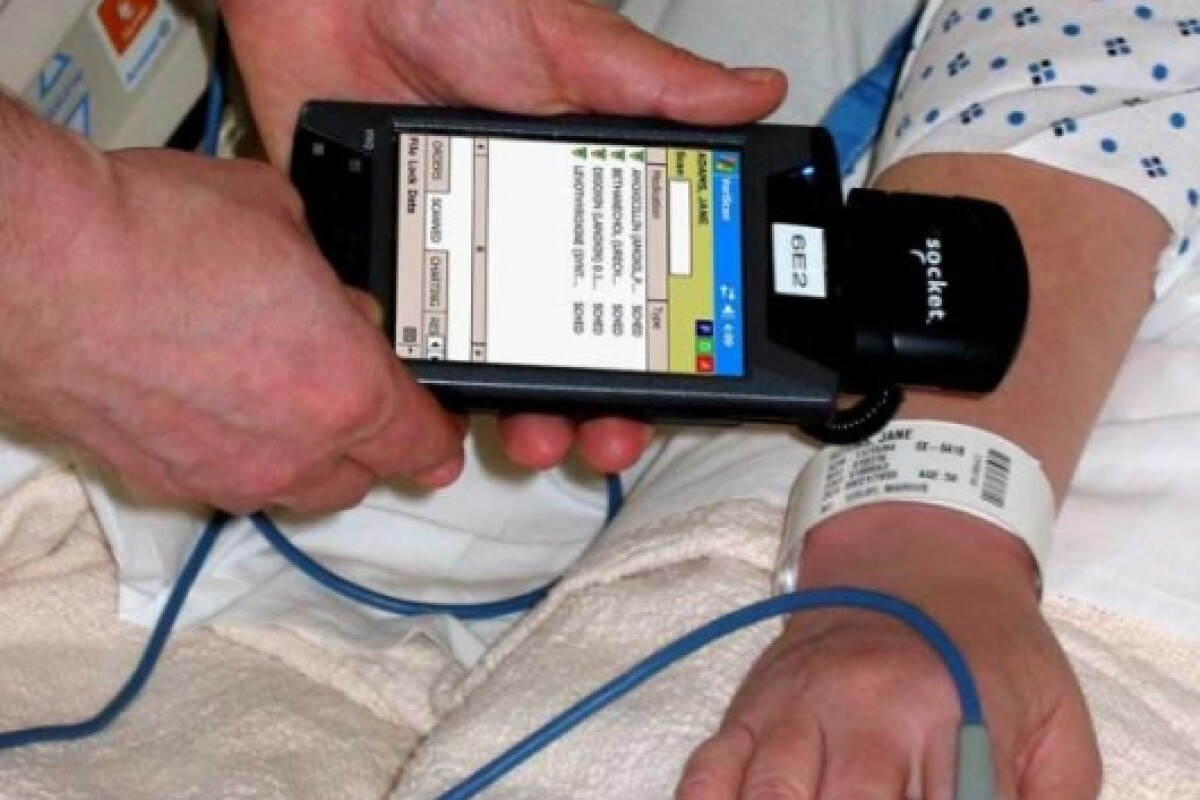June 6, 2006 We just love clever systems that reduce error and make the world a more efficient and safer place, and the devilishly clever VeriScan medication administration system fits the bill perfectly, using a synthesis of bar code and Radio Frequency Identification (RFID) tag readers to track medication directly at the patient's bedside. VeriScan runs on a Pocket PC equipped with a dual RFID and bar code reader. The nurse scans the bar code on the medication package and RFID tags on both the patient's wristband and the nurse's identification badge. Updates or changes to a patient's medication order are available in real-time, providing the nurse instant access to those changes, and the system also automatically charts each medication administration into the patient's Electronic Medical Record (EMR), saving data entry time and reducing the opportunity for human error. RFID technology is used on the patient's wristband and the caregiver's ID badge as it does not require direct contact or line-of-sight necessary for a bar code reader. It was announced yesterday that the US-developed system would be distributed to healthcare organizations in 15 Asian nations.
VeriScan was developed by software engineers at Sculptor Development Technologies (Sculptor) in 2003 using "real-world" input of St. Clair Hospital (Pittsburgh, PA) physicians, nurses and clinicians. Tested at the 331-bed St. Clair Hospital in early 2004, VeriScan is now installed in four U.S. hospitals and St. Clair Hospital is now piloting enhancements to VeriScan that check and record lab specimens and blood transfusions.
Sculptor, a subsidiary of St. Clair Hospital, announced yesterday it had entered into an agreement with Leading Information Technologies Institute, Inc. (LITI) of Tokyo, Japan to market and distribute Sculptor's VeriScan medication administration system to healthcare organizations in 15 Asian nations.
Under the license agreement, LITI will incorporate VeriScan software technology into its products and then market those products to hospitals and other healthcare organizations in countries such as Japan, Indonesia, Korea and China.
"The majority of medication errors each year at hospitals are at the point of administration," said Thomas Ague, president of Sculptor and Executive Vice President/COO of St. Clair Hospital. "The VeriScan system validates that the nurse is giving the right medication, in the right dose, at the right time via the right route to the right patient."
LITI is the leading provider of state-of-the-art RFID technology in Japan. Mark Hathaway, president of LITI's U.S. subsidiary said, "Our goal is to thoroughly automate the healthcare industry in Japan by applying RFID technology to improve efficiency and patient outcomes. We sought out leading hospitals in the U.S. with a proven track record using RFID technology, and after an extensive tour of select U.S. hospitals, we were convinced that St. Clair's VeriScan was the leading technology available in medication error prevention. We needed an RFID-centric application that would compliment our existing solutions. Since VeriScan ensures accuracy with each medication administration, it will blend nicely with our comprehensive healthcare offerings."
"VeriScan technology prevents thousands of medication errors every year, saving lives and delivering millions of dollars in cost-savings - it's a winner," he said.
"VeriScan compares patient and medication data with the physician's order in the hospital's clinical information system to ensure a correct match." said Richard Schaeffer, chief information officer and vice president, St. Clair Hospital. "The nurse is immediately alerted to discrepancies and potential errors are prevented."
"The nurse holds the Pocket PC within a couple of inches of the RFID wristband and receives instant patient verification," he said. "This system requires fewer physical patient touches, thereby reducing the chances of nosocomial infections and speeds the medication administration process."





